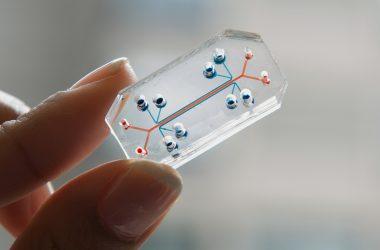Health
Getting ahead of liver cancer
Researchers hope identifying blood proteins may lead to earlier prediction of risk, increase treatment options
A new study suggests that proteins detectable in the blood could improve predictions about risk of liver cancer, which is typically diagnosed at later stages when survival rates are lower.
Led by investigators at Harvard-affiliated Beth Israel Deaconess Medical Center and Mass General Brigham, the team’s results are published in JNCI.
Liver cancer, or hepatocellular carcinoma (HCC), ranks as the third leading cause of cancer worldwide and the second leading cause of cancer-related deaths globally, with its incidence rate steadily increasing. Detection of liver cancers often occurs at advanced stages, when life expectancy typically spans less than 12 months. Currently, there is a notable deficiency in accurate, sensitive, and specific tools for the early detection of liver cancer. Many existing methods are relatively expensive, invasive, or limited in accessibility, primarily confined to major hospitals.
“Liver cancer rates are rapidly increasing, and liver cancer has a high mortality rate, but if we can diagnose it early, therapeutic interventions can be potentially curative.”
Xinyuan Zhang, BWH
The team used proteomics, the study and profiling of proteins, to develop a minimally invasive model for diagnosing or screening for liver cancer at an earlier, more treatable stage. Using the SomaScan Assay Kit — a high-throughput proteomics platform that measures protein levels in biological samples, available through BIDMC’s Genomics, Proteomics, Bioinformatics and Systems Biology Center — the investigators detected 1,305 biologically relevant proteins that may be present in the blood at early stage of disease.
“Liver cancer rates are rapidly increasing, and liver cancer has a high mortality rate, but if we can diagnose it early, therapeutic interventions can be potentially curative,” said lead author Xinyuan (Cindy) Zhang of the Channing Division of Network Medicine at Brigham and Women’s Hospital. “We need to have a way to detect this form of cancer early enough to intervene with surgery or liver transplantation to treat the disease before it becomes metastatic.”
The study team used SomaScan to analyze plasma samples from participants in both the Nurses’ Health Study and the Health Professional Follow-Up Study, two longitudinal, ongoing, prospective cohorts in the U.S. Notably, they examined blood samples obtained from patients an average of 12 years before their liver cancer diagnosis to pinpoint protein biomarker signals. After examination, the researchers cross-referenced medical records to confirm whether these patients ultimately developed liver cancer.
From the blood samples, the researchers identified 56 plasma proteins that showed significantly elevated levels in patients with liver cancer compared to matched control samples without HCC. The team selected four of these proteins to create a predictive model, which they tested on the U.K. Biobank Pharma Proteomics dataset, comprised of 50,000 individuals, 45 of whom were diagnosed with liver cancer. Their model had greater accuracy in predicting liver cancer compared to traditional risk factors.
The authors caution that their study included a limited number of liver cancer cases and further validation in larger, more diverse patient populations and in high-risk populations is needed.
“It’s always been challenging to identify highly specific disease biomarkers in the blood using traditional tools, but new technology allows us to detect a broad and dynamic range of both high and low abundant proteins,” said co-senior author Towia A. Libermann of the division of Interdisciplinary Medicine and Biotechnology at BIDMC. “New insights into the biological mechanisms underlying liver cancer development emerge from our data that may lead to identification of novel therapeutic targets. Most importantly, we were able to validate these early detection biomarkers using alternative protein analysis techniques and in an independent population cohort from the U.K.”
The study team aims to extend their methodology to uncover additional plasma protein biomarkers, explore biomarkers linked with different cancer types, and gain deeper insights into the role of HCC risk factors across specific patient populations. With further progress, the protein biomarkers investigated in the study could potentially hold clinical significance as a non-invasive test for assessing liver cancer risk.
“Even though further investigation in additional populations is needed, our results reveal a robust circulating protein profile associated with liver cancer years before diagnosis, which is truly remarkable,” said co-senior author Xuehong Zhang, who conducted work on this study while at the Channing Division of Network Medicine at the Brigham. Zhang is now at Yale
Additional authors include Long H. Ngo, Simon T. Dillon, Xuesong Gu and Michelle Lai, of BIDMC; Longgang Zhao of BWH; Tracey G. Simon and Andrew T. Chan of MGH; and Edward L. Giovannucci of the Harvard T.H. Chan School of Public Health.
This study was supported by the National Institutes of Health (NIH)/National Cancer Institute (NCI) through grants R21 CA238651. Andrew T. Chan served as a consultant for Bayer Pharma AG, Pfizer Inc., and Boehringer Ingelheim for work unrelated to this topic. He has also received grant support from Pfizer Inc., Zoe Ltd, and Freenome for work unrelated to this topic.





